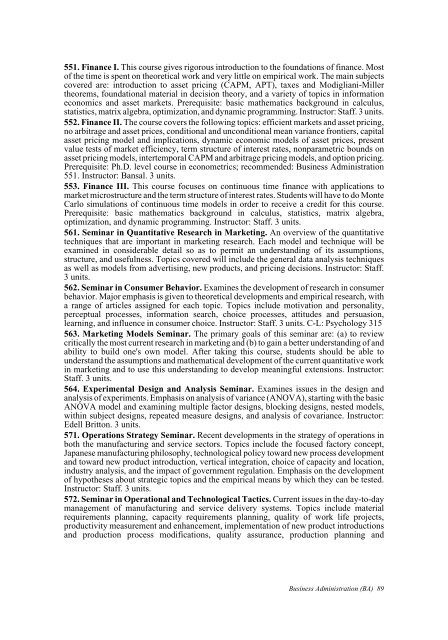2005-06 - Office of the Registrar - Duke University
2005-06 - Office of the Registrar - Duke University
2005-06 - Office of the Registrar - Duke University
Create successful ePaper yourself
Turn your PDF publications into a flip-book with our unique Google optimized e-Paper software.
551. Finance I. This course gives rigorous introduction to <strong>the</strong> foundations <strong>of</strong> finance. Most<br />
<strong>of</strong> <strong>the</strong> time is spent on <strong>the</strong>oretical work and very little on empirical work. The main subjects<br />
covered are: introduction to asset pricing (CAPM, APT), taxes and Modigliani-Miller<br />
<strong>the</strong>orems, foundational material in decision <strong>the</strong>ory, and a variety <strong>of</strong> topics in information<br />
economics and asset markets. Prerequisite: basic ma<strong>the</strong>matics background in calculus,<br />
statistics, matrix algebra, optimization, and dynamic programming. Instructor: Staff. 3 units.<br />
552. Finance II. The course covers <strong>the</strong> following topics: efficient markets and asset pricing,<br />
no arbitrage and asset prices, conditional and unconditional mean variance frontiers, capital<br />
asset pricing model and implications, dynamic economic models <strong>of</strong> asset prices, present<br />
value tests <strong>of</strong> market efficiency, term structure <strong>of</strong> interest rates, nonparametric bounds on<br />
asset pricing models, intertemporal CAPM and arbitrage pricing models, and option pricing.<br />
Prerequisite: Ph.D. level course in econometrics; recommended: Business Administration<br />
551. Instructor: Bansal. 3 units.<br />
553. Finance III. This course focuses on continuous time finance with applications to<br />
market microstructure and <strong>the</strong> term structure <strong>of</strong> interest rates. Students will have to do Monte<br />
Carlo simulations <strong>of</strong> continuous time models in order to receive a credit for this course.<br />
Prerequisite: basic ma<strong>the</strong>matics background in calculus, statistics, matrix algebra,<br />
optimization, and dynamic programming. Instructor: Staff. 3 units.<br />
561. Seminar in Quantitative Research in Marketing. An overview <strong>of</strong> <strong>the</strong> quantitative<br />
techniques that are important in marketing research. Each model and technique will be<br />
examined in considerable detail so as to permit an understanding <strong>of</strong> its assumptions,<br />
structure, and usefulness. Topics covered will include <strong>the</strong> general data analysis techniques<br />
as well as models from advertising, new products, and pricing decisions. Instructor: Staff.<br />
3 units.<br />
562. Seminar in Consumer Behavior. Examines <strong>the</strong> development <strong>of</strong> research in consumer<br />
behavior. Major emphasis is given to <strong>the</strong>oretical developments and empirical research, with<br />
a range <strong>of</strong> articles assigned for each topic. Topics include motivation and personality,<br />
perceptual processes, information search, choice processes, attitudes and persuasion,<br />
learning, and influence in consumer choice. Instructor: Staff. 3 units. C-L: Psychology 315<br />
563. Marketing Models Seminar. The primary goals <strong>of</strong> this seminar are: (a) to review<br />
critically <strong>the</strong> most current research in marketing and (b) to gain a better understanding <strong>of</strong> and<br />
ability to build one's own model. After taking this course, students should be able to<br />
understand <strong>the</strong> assumptions and ma<strong>the</strong>matical development <strong>of</strong> <strong>the</strong> current quantitative work<br />
in marketing and to use this understanding to develop meaningful extensions. Instructor:<br />
Staff. 3 units.<br />
564. Experimental Design and Analysis Seminar. Examines issues in <strong>the</strong> design and<br />
analysis <strong>of</strong> experiments. Emphasis on analysis <strong>of</strong> variance (ANOVA), starting with <strong>the</strong> basic<br />
ANOVA model and examining multiple factor designs, blocking designs, nested models,<br />
within subject designs, repeated measure designs, and analysis <strong>of</strong> covariance. Instructor:<br />
Edell Britton. 3 units.<br />
571. Operations Strategy Seminar. Recent developments in <strong>the</strong> strategy <strong>of</strong> operations in<br />
both <strong>the</strong> manufacturing and service sectors. Topics include <strong>the</strong> focused factory concept,<br />
Japanese manufacturing philosophy, technological policy toward new process development<br />
and toward new product introduction, vertical integration, choice <strong>of</strong> capacity and location,<br />
industry analysis, and <strong>the</strong> impact <strong>of</strong> government regulation. Emphasis on <strong>the</strong> development<br />
<strong>of</strong> hypo<strong>the</strong>ses about strategic topics and <strong>the</strong> empirical means by which <strong>the</strong>y can be tested.<br />
Instructor: Staff. 3 units.<br />
572. Seminar in Operational and Technological Tactics. Current issues in <strong>the</strong> day-to-day<br />
management <strong>of</strong> manufacturing and service delivery systems. Topics include material<br />
requirements planning, capacity requirements planning, quality <strong>of</strong> work life projects,<br />
productivity measurement and enhancement, implementation <strong>of</strong> new product introductions<br />
and production process modifications, quality assurance, production planning and<br />
Business Administration (BA) 89









